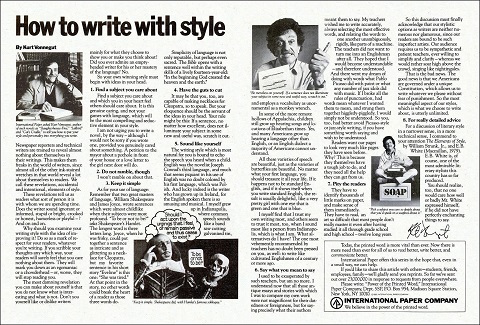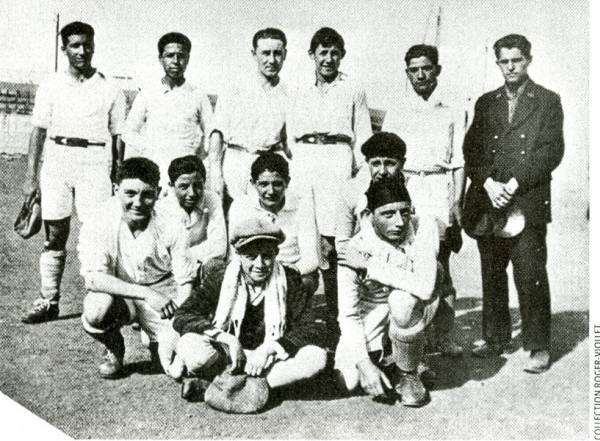If you feel the need for tips on developing a writing style, you probably don’t look right to the Institute of Electrical and Electronics Engineers’ journal Transactions on Professional Communications. You certainly don’t open such a publication expecting such tips from novelist Kurt Vonnegut, a writer with a style of his own if ever there was one.
But in a 1980 issue, the author of Slaughterhouse-Five, Jailbird, and Cat’s Cradle does indeed appear with advice on “how to put your style and personality into everything you write.” What’s more, he does it in an ad, part of a series from the International Paper Company called “The Power of the Printed Word,” ostensibly meant to address the need, now that “the printed word is more vital than ever,” for “all of us to read better, write better, and communicate better.”
This arguably holds much truer now, given the explosion of textual communication over the internet, than it did in 1980. And so which of Vonnegut’s words of wisdom can still help us convey our words of wisdom? You can read the full PDF of this two-page piece of ad-ucation here, but some excerpted points follow:
- Find a subject you care about. “Find a subject you care about and which you in your heart feel others should care about. It is this genuine caring, and not your games with language, which will be the most compelling and seductive element in your style. I am not urging you to write a novel, by the way — although I would not be sorry if you wrote one, provided you genuinely cared about something. A petition to the mayor about a pothole in front of your house or a love letter to the girl next door will do.”
- Keep it simple. “As for your use of language: Remember that two great masters of language, William Shakespeare and James Joyce, wrote sentences which were almost childlike when their subjects were most profound. ‘To be or not to be?’ asks Shakespeare’s Hamlet. The longest word is three letters long. Joyce, when he was frisky, could put together a sentence as intricate and as glittering as a necklace for Cleopatra, but my favorite sentence in his short story ‘Eveline’ is this one: ‘She was tired.’ At that point in the story, no other words could break the heart of a reader as those three words do.”
- Sound like yourself. “English was Conrad’s third language, and much that seems piquant in his use of English was no doubt colored by his first language, which was Polish. And lucky indeed is the writer who has grown up in Ireland, for the English spoken there is so amusing and musical. I myself grew up in Indianapolis, where common speech sounds like a band saw cutting galvanized tin, and employs a vocabulary as unornamental as a monkey wrench. [ … ] No matter what your first language, you should treasure it all your life. If it happens to not be standard English, and if it shows itself when your write standard English, the result is usually delightful, like a very pretty girl with one eye that is green and one that is blue. I myself find that I trust my own writing most, and others seem to trust it most, too, when I sound most like a person from Indianapolis, which is what I am. What alternatives do I have?”
- Say what you mean. “My teachers wished me to write accurately, always selecting the most effective words, and relating the words to one another unambiguously, rigidly, like parts of a machine. They hoped that I would become understandable — and therefore understood. And there went my dream of doing with words what Pablo Picasso did with paint or what any number of jazz idols did with music. If I broke all the rules of punctuation, had words mean whatever I wanted them to mean, and strung them together higgledy-piggledy, I would simply not be understood. Readers want our pages to look very much like pages they have seen before. Why? This is because they themselves have a tough job to do, and they need all the help they can get from us.”
While easy to remember, Vonnegut’s plainspoken rules could well take an entire career to master. I’ll certainly keep writing on the subjects I care most about — many of them on display right here on Open Culture — keeping it as simple as I can bear, saying what I mean, and sounding like… well, a rootless west-coaster, I suppose, but one question sticks in my mind: which corporation will step up today to turn out writing advice from our most esteemed men and women of letters?
via Biblioklept
Related Content:
Toni Morrison Dispenses Writing Wisdom in 1993 Paris Review Interview
Kurt Vonnegut’s Eight Tips on How to Write a Good Short Story
Stephen King’s Top 20 Rules for Writers
The Best Writing Advice Pico Iyer Ever Received
Colin Marshall hosts and produces Notebook on Cities and Culture and writes essays on cities, language, Asia, and men’s style. He’s at work on a book about Los Angeles, A Los Angeles Primer. Follow him on Twitter at @colinmarshall or on Facebook.




